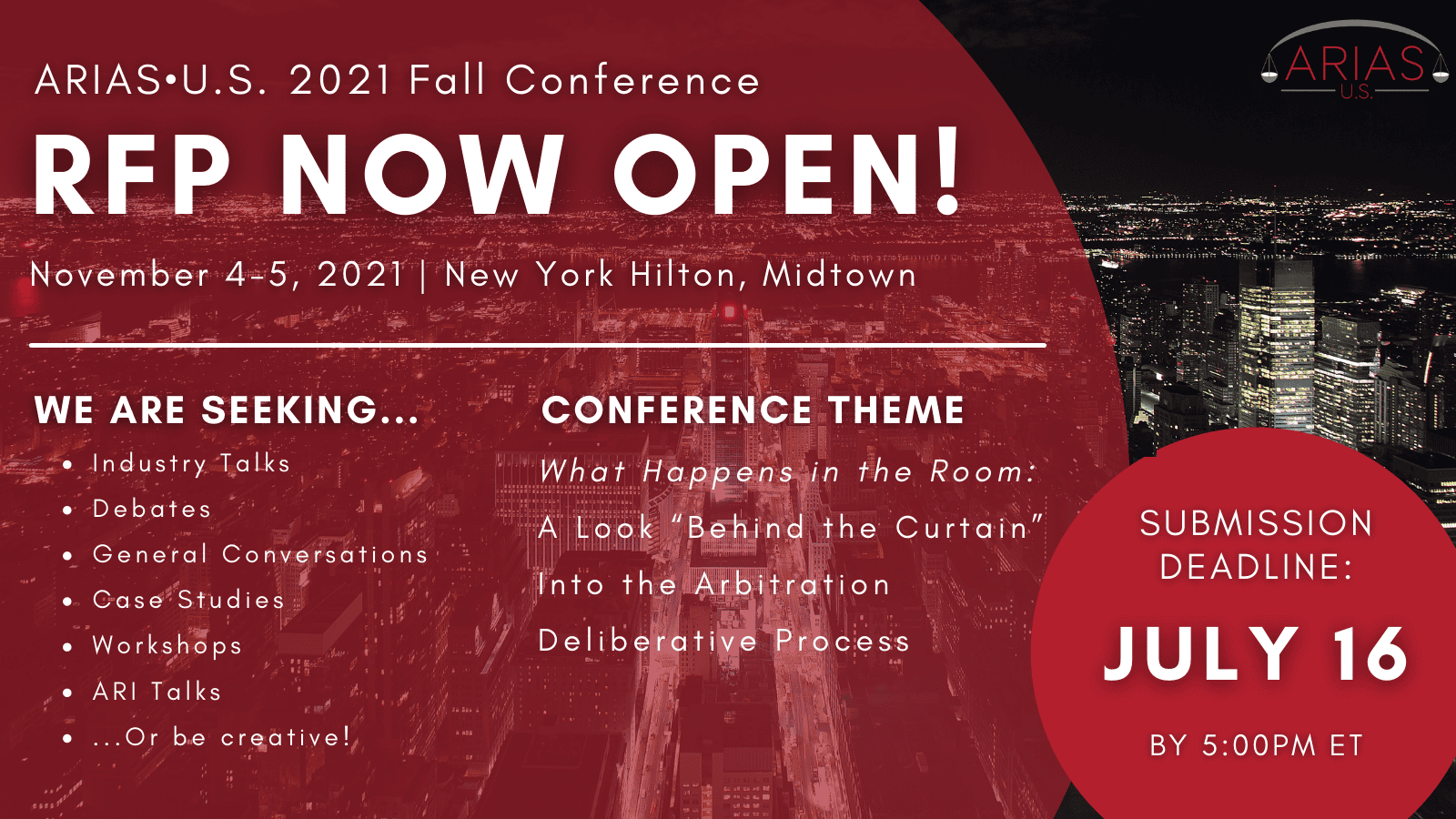2021 Fall Conference – Request for Proposals
Proposal Submission Deadline: July 16, 5:00 p.m. ET
For questions or comments, contact Jonathan Gilad at ARIAS·U.S. at jgilad@arias-us.org or 703.260.7515.
Download the instructions and submission form as a Fillable PDF or Word Document.
Proposal Timeline:
Proposal Submission Opens: June 7, 2021
Proposal Submission Closes: July 16, 2021 by 5:00 p.m. ET
OVERVIEW
ARIAS·U.S. is seeking dynamic, relevant, and fresh content for the 2021 Fall Conference to be held November 4-5 at the New York Hilton Midtown, NY.
ARIAS·U.S. is seeking submissions for 45 to 60-minute interactive presentations in a General or Breakout session format, as well as shorter sessions such as an ARI-Talk or other alternative formats. Submissions should be interactive, skill-based, collaborative and/or audience participative or other forms of presentation that encourage interaction and lively discussions. Click here to view guidelines for submission.
CONFERENCE THEME
What Happens in the Room: A Look “Behind the Curtain” Into the Arbitration Deliberative Process
The goal of the conference is to gain a better understanding of what really goes on during the arbitration deliberative process and to identify, by sharing experiences and preferences, alternatives, and best practices to make the arbitration process more fair, more efficient, and more transparent. What really goes on “behind the curtain”? How are arguments debated and evaluated, and how are decisions reached? How do panels respond and react to how parties and counsel present their positions and arguments? What approaches and methods “work,” are more efficient, or more likely to be well received? What approaches are counterproductive? What are your “pet peeves” about what is wrong with the arbitration process, and what would you do to fix it?
Download the instructions and submission form as a Fillable PDF or Word Document.
SUGGESTED TOPICS
General and Breakout Session Thought Starters
Here are some potential topics, but please be creative and let us know how you would tackle this important subject:
- What is the proper role of party-appointed arbitrators? Should they be truly objective and impartial, or are they just another layer of advocacy, a “shadow counsel” advocating the positions asserted by the party that appointed them, regardless of their personal views of the merits?
- Should arbitrators take over cross examinations to score points, or be limited to asking questions to elicit information that they believe might be helpful to the panel?
- Should panel questions be subject to a time limitation, or discussed by the panel in advance to reach consensus, and then posed only by the umpire?
- Perry Mason, or a business discussion? How do arbitrators react to overly aggressive cross-examinations and other trial tactics? Are attempts to make “gotcha” points a turnoff, merely tolerated, or are they potentially helpful? Do arbitrators prefer a straightforward approach designed to allow witnesses to tell their story, without being pressured or browbeaten?
- Is it time to revisit the utility of ongoing ex parte communications? Does involving arbitrators in substantive, tactical, or even procedural questions impair their objectivity, and, perhaps, credibility with the umpire? Would restricting ex parte communications enhance the prospect of a truly impartial outcome?
- Kitchen sink or targeted arguments? Does advancing every possible argument, no matter how attenuated, weak, or inconsistent, diminish the party’s credibility or impact the panel’s view of the party’s main arguments?
- How do arbitration panels react when experts are proffered? To what extent should arbitration panels give parties leeway, even if the disputed issue falls squarely within the panel’s experience and expertise? Do arbitrators view proffering experts to be a vote of “no confidence” or even insulting?
- How much “horse trading” goes on behind the scenes in panel deliberations, and is that appropriate or desired by parties and counsel?
- What’s the best way to present a case involving decades-old contracts where there are no percipient witnesses? Are client representative witnesses, to “humanize” and “put a face on” the company. helpful, preferable, ignored, or even annoying? How do arbitrators try to fill the void?
- What happens when the shoe is on the other foot? Under what circumstances will arbitration panels consider evidence of how a party conducts itself when the ceding company/reinsurer roles are reversed? Does lack of principled consistency diminish the party’s credibility?
Download the instructions and submission form as a Fillable PDF or Word Document.





